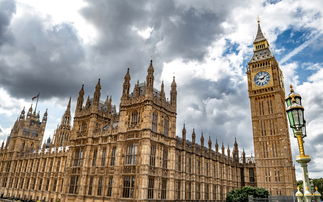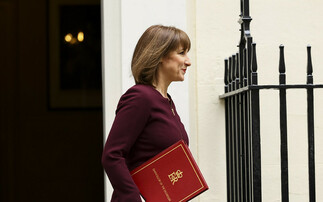The adoption of a net zero target is a genuinely historic breakthrough that promises to define the UK's eventual post-Brexit revival
It was the US comedian Eddie Cantor who first declared that "it takes 20 years to make an overnight success". He was talking about showbiz, but he inadvertently provided the defining motto for breakthrough developments in any field. It is rare in the extreme that drastic change comes out of a clear blue sky. Almost invariably years and years of hard graft has to be expended, laying the ground and building the foundations for the shift in thinking that suddenly, with the benefit of hindsight, looks inevitable.
That has certainly been the case with today's genuinely historic, legacy-securing, economically transformational pledge to adopt a net zero emission target for the UK. It seems obvious now. Of course, if we want to end the climate crisis we need to bring net global greenhouse gas emissions down to zero. Of course, if we want to minimise the risk of catastrophic tipping points in the climate system we need to get to net zero emissions as swiftly as possible. And yet, even in the wake of the Paris Agreement when every government in the world acknowledged that reality, the full implications of what had been agreed failed to sink in. The political and business conversation continued to circle around the idea of cutting emissions 60 per cent or 80 per cent, or decoupling emissions from economic growth.
And then, around 12 to 18 months ago - completely coincidentally at about the same time as we launched our Net Zero Now campaign - something shifted. Businesses and investors and politicians and economists and campaigners began to recognise that the Paris Agreement contained a commitment to a net zero emission target - a pledge to "achieve a balance between anthropogenic emissions by sources and removals by sinks of greenhouse gases in the second half of this century" to be precise. They began to acknowledge how even targets to cut emissions by 80 or 90 per cent gave high carbon sectors a pass, effectively telling them that they could go on emitting indefinitely. They started to make the case for full decarbonisation, the pursuit of deep emissions cuts across every part of the economy, the development of negative emissions approaches, and the economic, environmental, and climate resilience benefits that could flow from such an unprecedented industrial revolution.
And then - again coincidentally, or then again, perhaps not - something else happened. The northern hemisphere baked in a record heatwave, climate scientists' warnings finally achieved some serious media cut through, Greta Thunberg and over a million school strikers sparked headlines around the world, AOC turned the US climate debate on its head, Exinction Rebellion took to the streets, polls and elections revealed a Green surge, suddenly the incremental emissions savings that you could see out of the Overton Window on a clear day were replaced with the radical transformation of the entire global economic system and infrastructure that sustains it.
Throughout it all the case for a net zero target was being made by businesses, campaigners, and politicians. Facts and figures were marshalled, projections were developed, case studies were advanced, balances of risks and opportunities were weighed. And then something else unexpected happened. The counter-argument never came. Sure, a few keyboard warriors got angry and the Treasury launched a belated and cack-handed attempt to defer the decision, but the overblown warnings of economic apocalypse never gained traction. The arguments against a net zero target were utterly routed, blown away by escalating climate impacts, plummeting clean tech cost curves, and surging public demand.
Yes, it helped that the out-going Prime Minister was searching for a legacy, but the decision went far beyond that. After all, every candidate to become the next Prime Minister - bar one - has clearly seen which way the wind is blowing and endorsed the new target. Even when faced with a selectorate comprised of a disproportionate number of ageing climate sceptics and a clear incentive to dog whistle anti-green messages, Johnson and Raab and Javid and co have recognised that net zero is the right thing to do.
How did this remarkable sequence of events come to pass? Because of those 20 years of hard work. The foundations were there. The cost competitive wind farms, the surging electric vehicle sales, the coal-free grids, the huge numbers of leading businesses and investors lining up to demand a net zero target - they all added up to show that deep decarbonisation was possible, affordable, and desirable, and where significant technical and cultural challenges remained, such as with heat or heavy industry or aviation, plausible solutions were emerging. Suddenly the political and economic equations flipped. Inaction became more risky than action, and political and business leaders understood that.
The result is a legal target where all the plaudits are justified. It does secure a legacy for Theresa May beyond Brexit, despite her still underpowered environmental record. It will drive a new wave of decarbonisation policies and investment, both in the UK and overseas. It is an historic moment.
This is the Paris Agreement in action, precisely as it was intended to work. It is a leading country ratcheting up its climate action and sending a crystal clear signal to investors that fossil fuels are on their way out; that clean technologies, including negative emissions, are essential; that no one can say they weren't warned drastic change was coming. It will directly impact policy and investment decisions. It is telling the world that the first economy to industrialise is deliberately turning its back on the energy sources and infrastructure that enabled that industrialisation and established it as a global power.
Should today's celebrations be tempered? Yes and no.
The first thing to say is some of the nit-picking critiques put forward this morning, while technically valid, are somewhat overblown. The Treasury review of costs could prove an obstacle to more ambitious policies, especially if certain Ayn Rand-obsessives realise their ambitions of making it to Number 11, but the economic case for decarbonisation is too entrenched to be overturned. The potential use of offsets and the fudging of targets for aviation emissions are less than ideal, but they fail to seriously dilute the wide signal to investors. The promise of a review of the target in five years to check that other countries are following suit is simply a sop to the Treasury. It is entirely conceivable that both the EU and US (just look at the Democrat candidates making precisely the same calculations as the Tory leadership hopefuls and rushing to deliver net zero strategies) will have their own net zero targets by 2025. It is far more likely that competitiveness issues will be dealt with through subsidies and border adjustments than a rolling back of high profile emissions targets.
The much more valid concern is that, while it has proven surprisingly easy to win the net zero argument in the abstract, winning it over and over and over again for each specific policy or investment required will be far, far harder. Having a net zero target in place definitely helps strengthen the case for some of the politically difficult decisions successive governments have deferred, but it does not make some of the huge technical and economic challenges net zero implies any easier.
All of the frontrunners to become the next Prime Minister have found it easy to embrace a net zero target, but none of them are talking in any serious detail about enabling onshore wind and solar farms at scale or funding a national energy efficiency retrofit programme or banning gas boilers or turbo-charging green aviation R&D or engineering a revolution in agriculture and land use or delivering carbon capture and storage hubs or banning internal combustion engine vehicles within 15 years or accelerating smart grid development or re-thinking airport expansion or going vegetarian or holding quarterly COBRA-style climate crisis meetings. They have all happily served in governments that have cut spending on energy efficiency, undermined renewables development, and failed to put the UK on track to meet its current carbon targets, let alone the new net zero goal. Labour's impressive and ambitious net zero plans face similar questions about their funding, their efficacy, and the leadership's ability to deliver on its promises.
There are plenty of good reasons to question political leaders' willingness to take some of the tough decisions the net zero target will entail, even before you consider the way in which Brexit threatens to subsume any good intentions they may harbour. Because if the leadership candidates lack a credible net zero strategy between them, they similarly lack a credible Brexit strategy. Again, it may not be completely coincidental, but it is the green economy's curse that it has to engineer the biggest and fastest industrial revolution in human history at precisely the same time as the UK teeters on the brink of the largest political and constitutional crisis in modern history.
The net zero transition should be the core component of the national story of rejuvenation and reconciliation that should follow the eventual resolution of Brexit, but it remains as difficult as ever to see how we get from here to there, when every single Brexit plan on offer threatens to trigger economic instability and intensify deeply worrying and divisive betrayal narratives.
The reality is the net zero target will continue to face serious headwinds and the constant threat of an orchestrated backlash. But those are concerns for another day, because today the government and the UK's green economy made history.
One last point: whenever politicians or business leaders set long term targets the accusation is levelled that they don't care because they will not be around to see if they are met or not. But the thing about net zero by mid-century is that is not necessarily true. Theresa May is 62. If she is lucky enough to make it to 92, which is entirely plausible, she will see if her legacy is secured. Many of the people celebrating today's news will still be in the workforce when mid-century comes around. My sons will be younger than I am now.
As Labour's Alan Whitehead reflected when he spoke in Parliament's debate on the climate emergency earlier this year, the task of delivering on this target or unleashing climatic castastrophe is "on our watch". It has taken 20 years of hard work for the green economy to become an overnight success, but the really hard and rewarding graft is only just beginning.









